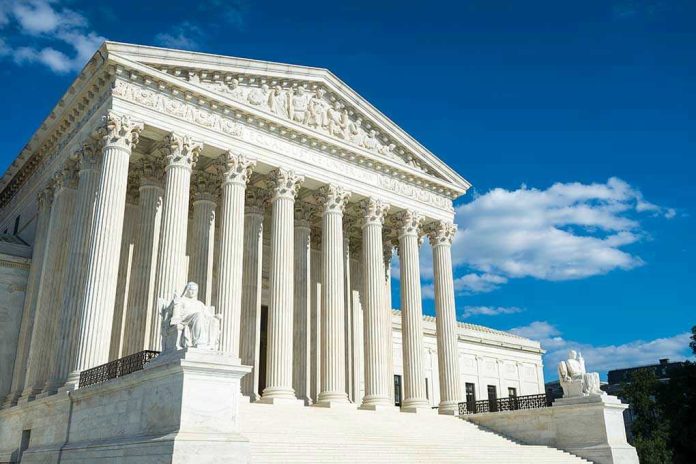
Supreme Court drama intensifies as President Trump launches a high-stakes bid to erase his legal defeat in the E. Jean Carroll sex abuse case, raising the stakes for political accountability and the future of presidential immunity.
Story Snapshot
- Trump petitions Supreme Court to overturn the E. Jean Carroll jury verdict
- Case probes the boundaries of presidential legal immunity
- Public scrutiny reveals deep divides over powerful figures facing civil liability
- Pivotal moment for legal precedent and American political culture
Trump’s Supreme Court Gambit: Seeking to Overturn the Carroll Verdict
Donald Trump’s legal team filed a petition with the Supreme Court to scrap the jury verdict that found him liable for sexually abusing writer E. Jean Carroll in the mid-1990s. This request confronts the nation’s highest court with a question that reverberates beyond a single case: How much legal protection should a president—past, present, or future—enjoy against civil accountability for alleged personal misconduct committed outside of office? The outcome could set a far-reaching precedent, not only for Trump, but for the boundaries of presidential immunity in American jurisprudence.
The legal arguments hinge on whether Trump’s actions are shielded by the broad legal immunity traditionally granted to presidents, especially regarding statements and conduct stemming from official duties. Trump’s lawyers assert that comments made about Carroll—during his presidency—fall within the scope of official communications, even though the underlying incident allegedly occurred decades earlier. Carroll’s attorneys, in contrast, argue that the jury already weighed the evidence and found Trump liable for personal conduct unrelated to his official role, establishing a clear line between presidential duties and private actions. The Supreme Court’s willingness to hear the case will test how elastic the concept of presidential immunity can be stretched under the scrutiny of modern law.
Public Reaction and Political Fallout
The case has ignited fierce debate among Americans, with public opinion sharply divided along political fault lines. Many conservatives express concern that holding presidents personally liable for statements or alleged actions outside their official duties could open the floodgates to endless litigation, undermining effective leadership. Others argue that no individual—no matter how powerful—should be immune from answering for personal misconduct, especially in cases as serious as sexual abuse. This dispute reflects a broader tension in American values: the balance between protecting the dignity of the office and upholding accountability for those who hold it.
The verdict against Trump already sent shockwaves through political circles, with allies decrying it as a partisan attack and critics championing it as overdue justice. Now, the Supreme Court’s involvement threatens to amplify these divisions, as both sides brace for a decision that could redefine the limits of executive privilege. The case has become a litmus test for the resilience of American institutions, as well as a referendum on society’s expectations of its leaders.
Legal Precedent and the Battle for Presidential Immunity
Presidential immunity has long been a cornerstone of American constitutional law, designed to protect sitting presidents from distractions and harassment that could impede their ability to govern. However, the Trump-Carroll dispute puts that principle under the microscope, asking whether presidents should retain such protections for actions unrelated to the office, especially when those actions involve serious allegations. Legal experts warn that a broad interpretation could shield future presidents from civil claims, even when their behavior crosses into the realm of personal misconduct.
If the Supreme Court agrees to hear Trump’s petition, the ruling will not only resolve one man’s legal fate but also set the contours for how courts address presidential accountability for decades to come. The stakes are immense: a decision to uphold the verdict could embolden plaintiffs and deter abuses of power, while a reversal might reinforce the authority of the presidency at the cost of individual justice. Americans are watching closely, knowing that the outcome will shape the legacy of both Trump and the nation’s enduring struggle to balance power with responsibility.
Sources:
Trump asks Supreme Court to reverse E. Jean Carroll verdict that he calls flawed



